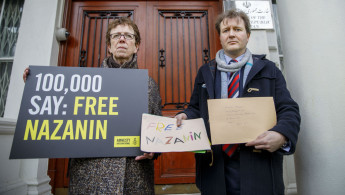Iran rejects 'illegal' UK diplomatic protection to detained British charity worker
Iran has accused the UK of breaking international law by granting diplomatic protection to a British charity worker jailed in Tehran over spy allegations.
It follows a decision by UK Foreign Secretary Jeremy Hunt to extend special diplomatic protection to Nazanin Zaghari-Ratcliffe, a British-Iranian dual national.
This was aimed at sending a "very strong message" to Iran, who campaigners say has been falsely charged on trumped up spying charges.
Iran's envoy to the UK said the decision "contravenes international law" and rejected the special protection to the dual national.
"UK Govt's extension of diplomatic protection to Ms Zaghari contravenes int'l law. Govts may only exercise such protection for own nationals," Hamid Baeidinejad tweeted late Thursday.
"As UK Govt is acutely aware, Iran does not recognize dual nationality. Irrespective of UK residency, Ms Zaghari thus remains Iranian," he wrote.
Zaghari-Ratcliffe has suffered from a range of health issues since being arrested while leaving Tehran after taking her infant daughter on a family visit in April 2016.
An Iranian court sentenced her five years for allegedly trying to topple the Tehran government, charges she and her employer strongly deny.
To protest a lack of proper medical care in jail, Zaghari-Ratcliffe went on hunger strike.
Her husband Richard said on Friday she was still suffering from "neurological problems".
"She was taken for an initial assessment to a doctor, who said she was surprised she was in prison given the health condition she was in," he told BBC radio.
UK Foreign Minister Jeremy Hunt granted "diplomatic Zaghari-Ratcliffe on Thursday, citing a lack of due process and access to medical treatment.
"I have today decided that the UK will take a step that is extremely unusual and exercise diplomatic protection," Hunt said in a statement.
"This represents formal recognition by the British government that her treatment fails to meet Iran's obligations under international law and elevates it to a formal state to state issue."
Hunt said he had "not taken this decision lightly" but considered the "unacceptable treatment" Zaghari-Ratcliffe had experienced during her three years in detention.
"We have not even been able to secure her the medical treatment she urgently needs despite assurances to the contrary," he added.
Iran has jailed a number of dual nationals and foreign visitors, whom critics say are used as bargaining chips with the West by the Tehran government.
Tehran's conservative judiciary has sought to flex its muscles by jailing moderates and dual nationals, analysts have said.





 Follow the Middle East's top stories in English at The New Arab on Google News
Follow the Middle East's top stories in English at The New Arab on Google News

![22 Arab countries at COP29 have rejected the targeting of fossil fuels [Getty]](/sites/default/files/styles/image_330x185/public/2024-11/GettyImages-2184289638.jpg?h=199d8c1f&itok=ptHl5bec)
![Dozens of people turned out for the funerals [Getty]](/sites/default/files/styles/image_330x185/public/2024-11/GettyImages-2185229760.jpg?h=e7c891e8&itok=1bctDcE6)